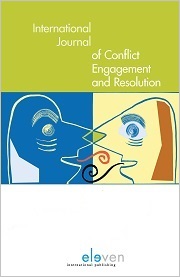|
The overall purpose of a restorative conference is to address the conflict implied in the committing of an offence. The conference convenes a community of care around the offence and invites participants to take up responsibility for addressing the situation. Through a case study drawn from a role-played scenario, this article shows how a restorative conference process in a school might be performed, after an offence has taken place. A transcribed role play is used here to illustrate a narrative practice in the facilitation of restorative conferences. This practice has been written about before, but here, the dialogue is made prominent, while around the dialogue, a commentary aims to make clear the purposes behind what is said. |


International Journal of Conflict Engagement and Resolution
About this journalSubscribe to the email alerts for this journal here to receive notifications when a new issue is at your disposal.
| Editorial |
|
| Authors | Sara Cobb |
| Author's information |
| Article |
|
| Keywords | restorative conference, restorative justice, narrative practice, case study, community of care |
| Authors | John Winslade |
| AbstractAuthor's information |
| Article |
|
| Keywords | narrative, conflict resolution, development, assessment, evaluation |
| Authors | Sarah Federman |
| AbstractAuthor's information |
|
While stories have circulated for millennia and constitute the very fabric of life in society, narrative as an optic for understanding and engaging with conflict emerged in the field of conflict resolution only in the past few decades, and has already amassed an array of significant contributions (Bar-Tal and Salomon, 2006; Cobb, 2013; Grigorian and Kaufman, 2007; Kellett, 2001; Lara, 2007; Nelson, 2001; Rotberg, 2006; Winslade and Monk, 2000). They encompass several spheres of action. Narrative analysis provides a means to locate individual and communal meaning in their discourse and to pinpoint conflicts in their world views that threaten their identity and agency. Further, it helps explain how marginalized people remain marginalized. Narrative interventions allow for conflict transformation, helping people to renegotiate their social positions and reclaim lost agency stemming from marginalized positions. Narrative evaluation highlights the flexibility of that model to measure change through a detection of discursive shifts over time. This article provides an overview of narrative approaches to conflict, answering: (a) What is narrative and what is its potential as a tool for understanding and responding to conflict? (b) How might we conduct a narrative analysis of a conflict? (c) From this analysis, how might we then construct narrative interventions and programme evaluations? |
| Article |
|
| Keywords | narrative, gender, conflict, violence, victimhood |
| Authors | Jessica M. Smith |
| AbstractAuthor's information |
|
As the nature of global violence shifts and conflict becomes increasingly characterized by intrastate violence, theoretical underpinnings of violence and aggression based on Westphalian models have become insufficient. Contemporary warfare is no longer confined to acts of violence between states using large-scale weaponry where non-combatants are rarely at the front lines. Instead, small arms have allowed rebel groups to bring the front lines of conflict to villages, resulting in a much deadlier age of violence against civilians. This shift has led to an increase in attention to the impact of violent conflict on civilians, including a consideration of the gendered experiences of women, men, girls and boys. |
| Article |
|
| Keywords | participation, structural violence, narrative compression, master-counter narratives |
| Authors | Sara Cobb and Alison Castel |
| AbstractAuthor's information |
|
“Participation” has been defined as the engagement of local populations in the design and implementation of peace-building processes in post-conflict settings and it has been presumed to be critically important to sustainable conflict intervention. In this article, we explore this concept, so central to the field of conflict resolution, focusing on a set of problematic assumptions about power and social change that undergird it. As a remedy to these issues, we offer a narrative as a lens on the politics of participation. This lens thickens our description of our own participation as interveners, a reflexive move that is notably missing in most efforts to redress the dark side of “participation” – that it has often been used as a means to upend structural violence, only to contribute to its reproduction. Drawing on the work of Ginwright, specifically his work with black youth in Oakland, CA, we explore participation as a process involving the critical examination of master/counternarratives. By offering a narrative lens on participation, we hope to illuminate a framework for the ethics of conflict resolution practice that enables practitioners to ethically navigate the politics of “participation.” |
| Article |
|
| Keywords | literary approaches to conflict resolution, narrative theory, mass movements, social transformation, social injustice |
| Authors | Angelica R. Martinez and Richard E. Rubenstein |
| AbstractAuthor's information |
|
The study of literature, although relatively new to the field of peace and conflict studies, has proven to be a valuable way to develop our understanding of violent social conflicts and the possible methods of resolving or transforming them. Literary texts present students of human conflict and conflict resolution with an appreciation of the power of “thick” descriptions of the human experience and the problems with “thin” modes of expression. Narrative and literary works reveal the indelible marks that violence and conflict inscribe on those left in their wake. Examining conflict through literature also grants students access to the ethical and moral dilemmas that people face as they navigate complex and oppressive social systems. A graduate-level course in “Conflict and Literature” taught for the past ten years at George Mason University provides evidence of these uses and suggests the possibility of further pedagogical developments. |

 Issue 2
Issue 2